|
|
|
Sort Order |
|
|
|
Items / Page
|
|
|
|
|
|
|
| Srl | Item |
| 1 |
ID:
186160
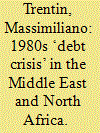

|
|
|
|
|
| Summary/Abstract |
The article reviews the positions and policies of Middle Eastern and North African states towards the external ‘debt crisis’ of the 1980s within the context of contemporary debates and negotiations held at regional and international levels. MENA countries shared many commonalities with their developing partners across the postcolonial world and participated actively in the debates within multilateral organizations, such as the United Nations Conference on Trade and Development (UNCTAD). Because standard borrowing in the MENA was public, bilateral and closely tied to politics, the article argues for the relevance of regional factors in shaping the course of the debt crisis in the MENA region, and challenges the common visions for which Western creditors could manage external debt as an effective ‘lever’ for introducing neoliberal policies: oil endowment, armed conflicts and alliances shaped the timing and results of the debt crisis in the MENA. The research is based on an extensive review of regional and international literature coupled with documents and proceedings from the UN organizations.
|
|
|
|
|
|
|
|
|
|
|
|
|
|
|
|
| 2 |
ID:
184741
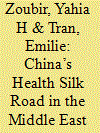

|
|
|
|
|
| Summary/Abstract |
The COVID-19 pandemic has offered China a unique opportunity for worldwide deployment of its longstanding health diplomacy, renamed the Health Silk Road (HSR), now an integral part of its Belt and Road Initiative. As a self-proclaimed South-South collaborator and developer,1Beijing has assumed a leadership role, grounded in ‘moral realism’, in the world’s health governance. Beijing’s health diplomacy has received acclaim in the Middle East and North Africa (MENA). However, the pandemic has exacerbated preexisting tensions between China, the United States (US) and European Union (EU). Western countries, wary of China’s rising power, reacted resentfully, confirming underlying systemic rivalry. This article argues that the currently disputed, or shifting, world order accounts for the diametrically opposed reactions between the West and the MENA toward China’s Health Silk Road.
|
|
|
|
|
|
|
|
|
|
|
|
|
|
|
|
| 3 |
ID:
179806
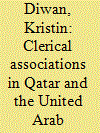

|
|
|
|
|
| Summary/Abstract |
In the wake of the 2011 Arab uprisings, the wealthy Gulf states of Qatar and the United Arab Emirates began hosting and establishing associations of influential Islamic scholars. These clerical associations, the Doha-based International Union for Muslim Scholars (IUMS) and the Abu Dhabi-based Muslim Council of Elders (MCE) and associated peace initiatives, have afforded a platform for more credibly entering into religious and political debates, for cultivating new networks of influence among Muslim publics, and engaging non-Islamic countries and organizations. Drawing upon interviews and primary resources, this study investigates this exercise in religious statecraft, comparing the discourse and policy interventions of these associations, and analysing their improbable challenge to the predominant religious terms set by the traditional heavyweight in the Gulf, Saudi Arabia. It finds that the effectiveness, or resonance, of these religious soft power projects depends upon credibility—their alignment with national religious traditions and policy directions—and positioning—the targeting of particular audiences and stakeholders. It concludes that the UAE holds certain advantages over Qatar in its soft power positioning in the current nationalist moment, as states gain ground over transnational Islamic movements and relations with powers such as India, Russia, China and Israel—all hostile to independent Islamic movements—gain in importance. Policy-makers acknowledging the surprising hard power projection of these small states through military interventions and economic leverage may benefit from this study of their new religious soft power influence.
|
|
|
|
|
|
|
|
|
|
|
|
|
|
|
|
| 4 |
ID:
146344
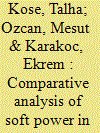

|
|
|
|
|
| Summary/Abstract |
This study explores the relationship between ethnic, sectarian, and religious identities and soft power in the Middle East and North Africa (MENA) region in the immediate aftermath of the Arab Uprisings. Utilizing original public opinion surveys conducted in Egypt and Iraq in 2012, we find that identity-based allegiances play a major role in groups’ choices regarding which countries’ increasing involvement in the region are seen favorably and which countries are seen as an ideal model for the region. Sunnis are likely to view Turkey and Saudi Arabia positively in both regards, whereas Shiites are more supportive of Iran. But our results also suggest that crosscutting cleavages should not be overlooked: Sunni Kurds are less likely to hold positive attitudes toward Turkey and Saudi Arabia. Our findings also show that Copts, a religious minority in Egypt, hold positive attitudes toward the United States and negative ones toward Saudi Arabia and Iran. These findings contribute to both the theoretical literature on soft power and the debates on international competition for influence in the MENA region by emphasizing the role of ethnic and religious identities in shaping attitudes toward international actors.
|
|
|
|
|
|
|
|
|
|
|
|
|
|
|
|
| 5 |
ID:
175528
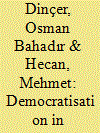

|
|
|
|
|
| Summary/Abstract |
Instead of writing off the post-uprising period in the Middle East and North Africa (MENA) as a failed attempt at democratisation, this article argues that the region is still undergoing an ambiguous and contingent process in which democratisation survives as one likely path among others. From this alternative viewpoint, the uprisings have multi-faceted, complex and uncertain consequences that constitute the beginnings of a long-term transitional phase in which various forces of political development continue to coexist in competing fashions. We argue that amidst this ambiguous process, the uprisings have introduced game-changing dynamics with regard to democratisation. We further attempt to identify these dynamics and discuss the potential value of the post-uprising experience as an asset for regional democratisation. For this purpose, we underline at least three crucial aspects of the post-uprising experience regarding democratic development in the region: (1) the demonstration of the potential for political change, (2) the contribution to the democratic learning curve, and (3) the emergence of Tunisia as a ‘transition game’. This study aims to serve as a guiding analytical exercise in the study of democratisation within ambiguous political environments, such as the post-uprising MENA region, where identifying the direction of democratisation may prove difficult.
|
|
|
|
|
|
|
|
|
|
|
|
|
|
|
|
| 6 |
ID:
168847
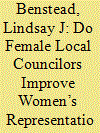

|
|
|
|
|
| Summary/Abstract |
Tunisia’s 2018 municipal elections, in which a legislated quota was implemented and women won 47 percent of seats, raises questions about whether electing female councilors improves women’s representation in clientelistic settings. Using data from the Local Governance Performance Index (LGPI), an original survey of 3,600 Tunisians conducted in 2015 by the Program on Governance and Local Development (GLD), this article investigates the relationship between local councilors’ gender and women’s access to help with personal or community issues. Three findings emerge. First, male citizens are thirteen percentage points more likely than female citizens to know a local councilor and six percentage points more likely to have contacted a councilor for help. This offers evidence of greater network homosociality for club goods than personal requests. Second, citizens of both genders are twice as likely to contact a councilor of the same gender when asking for help with community problems. Finally, electing females increases women’s access to councilors, due to network homosociality—that is, denser personal networks with others of the same gender—but has a limited impact on men’s access because female councilors have more heterosocial networks. By showing that electing and appointing women improves service and allocation responsiveness to females, the results call attention to the need to address gender equity issues when drafting electoral laws and implementing decentralization laws.
|
|
|
|
|
|
|
|
|
|
|
|
|
|
|
|
| 7 |
ID:
164754
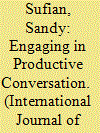

|
|
|
| 8 |
ID:
101403
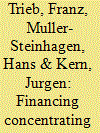

|
|
|
|
|
| Publication |
2011.
|
| Summary/Abstract |
The paper presents a strategy for the market introduction of concentrating solar power (CSP) plants in the Middle East and North Africa (MENA) that will not require considerable subsidization and will not constitute a significant burden for electricity consumers in the region. In the first section, the paper explains the need of MENA countries for sustainable supply of electricity and calculates the cost of electricity for a model case country. In the second part, the cost development of concentrating solar power plants is calculated on the basis of expectations for the expansion of CSP on a global level. After that, the challenges for the market introduction of CSP in MENA are explained. Finally, we present a strategy for the market introduction of CSP in MENA, removing the main barriers for financing and starting market introduction in the peak load and the medium load segment of power supply. The paper explains why long-term power purchase agreements (PPA) for CSP should be calculated on the basis of avoided costs, starting in the peak load segment. Such PPA are not yet available, the paper aims to convince policy makers to introduce them.
|
|
|
|
|
|
|
|
|
|
|
|
|
|
|
|
| 9 |
ID:
181867
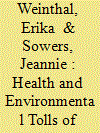

|
|
|
|
|
| Summary/Abstract |
The effects of conflict on public health and ecosystem well-being are understudied and rarely figure in public debates about war-making. Protracted conflicts are particularly damaging to people and environments in ways that are inadequately documented. In recent wars in the Middle East and North Africa, parties to the conflicts have induced hunger and displacement and undermined public health through the use of violence and economic policies that deprive civilians of access to food, water, fuel, and livelihoods. Environmental pollution is widespread, particularly in cities that became war zones, while the COVID-19 pandemic has deepened conflict-induced poverty and food insecurity.
|
|
|
|
|
|
|
|
|
|
|
|
|
|
|
|
| 10 |
ID:
193667
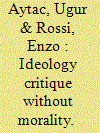

|
|
|
|
|
| Summary/Abstract |
What is the point of ideology critique? Prominent Anglo-American philosophers recently proposed novel arguments for the view that ideology critique is moral critique, and ideologies are flawed insofar as they contribute to injustice or oppression. We criticize that view and make the case for an alternative and more empirically oriented approach, grounded in epistemic rather than moral commitments. We make two related claims: (a) ideology critique can debunk beliefs and practices by uncovering how, empirically, they are produced by self-justifying power and (b) the self-justification of power should be understood as an epistemic rather than moral flaw. Drawing on the recent realist revival in political theory, we argue that this genealogical approach has more radical potential, despite being more parsimonious than morality-based approaches. We demonstrate the relative advantages of our view by discussing the results of empirical studies on the contemporary phenomenon of neopatriarchy in the Middle East and North Africa.
|
|
|
|
|
|
|
|
|
|
|
|
|
|
|
|
| 11 |
ID:
192643
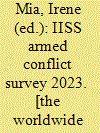

|
|
|
|
|
| Publication |
Oxon, Routledge, 2023.
|
| Description |
340p.pbk
|
| Standard Number |
9781032736709
|
|
|
|
|
|
|
|
|
|
|
|
Copies: C:1/I:0,R:1,Q:0
Circulation
| Accession# | Call# | Current Location | Status | Policy | Location |
| 060456 | 355.0205/MIA 060456 | Main | On Shelf | Reference books | |
|
|
|
|
| 12 |
ID:
186158
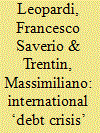

|
|
|
|
|
| Summary/Abstract |
The year 2022 marks the fortieth anniversary of the 1982 Mexican debt crisis, the first of a long series of financial turbulences that would soon spread to most of the developing world and beyond. Ever since, international historiography has produced a wide arrange of analyses that, despite their diversity, came to see the 1980s international debt crisis as a momentous event through which the United States and Western Europe reimposed their financial hegemony over the decolonised world and socialist camp. The contributions to this special issue of Middle Eastern Studies primarily aim at reassessing the process that brought economic neoliberalism throughout the Middle East and North Africa (MENA) in the context of debt crises. In particular, they challenge ‘teleological’ views that see the opening to market economy as a result of the creditors’ agenda, thus depriving actors in debtor countries of their agency. The essays published herein explore the levers, instruments and policy-making process to which debtor states resorted to shape their own integration process in the global neoliberal economy.
|
|
|
|
|
|
|
|
|
|
|
|
|
|
|
|
| 13 |
ID:
167347
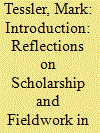

|
|
|
| 14 |
ID:
171940
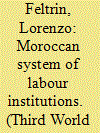

|
|
|
|
|
| Summary/Abstract |
The relevance of workers’ mobilisations in the 2011 Arab uprisings and – more recently – in the Algerian movement for democracy and social justice has encouraged a renewed interest in labour–state relations in the region. This article presents a class-based perspective on labour institutions, taking Morocco as a case study. In contrast to institution-based approaches, this research argues that it is problematic to treat the trade unions as analytical proxies for the working class, because this heuristic move conceals how class struggles – from below and from above – can transcend and transform labour institutions. The article proposes a framework to study labour–state relations, highlighting the relative autonomy of union officials from workers and vice versa. In this way, it shows how, in the neoliberal phase, the Moroccan state increased inducements to the unions while decreasing those to the workers and maintaining significant constraints on workplace organising. To use a simplified formulation, the regime included the unions to exclude the workers. In such a context of low union representativeness, the dangers of reducing the working class to the trade unions emerge clearly.
|
|
|
|
|
|
|
|
|
|
|
|
|
|
|
|
| 15 |
ID:
141168
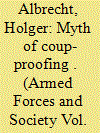

|
|
|
|
|
| Summary/Abstract |
This article argues that coup-proofing does not necessarily reduce the general propensity among military officers to stage coups d’état against authoritarian incumbents. Sophisticated coup-proofing terminates coup cascades and buys incumbent rulers time in office, but general coup risk remains high even if they maintain power for long periods of time. The article uses a new data set on coups in the Middle East and North Africa covering the period 1950–2013. The data reveal that the number of coup instances has decreased over time, but the risk for incumbents of falling to a coup during their extended time in office remains constant, even in coup-proofed autocracies. When autocrats apply coup-proofing measures, timing and agency become increasingly important. Plotters attempt coups either immediately after power turnovers or when incumbents turn into lame ducks after excessively long periods of rule. Success rates increase when coup plotters are supported by central military leaderships.
|
|
|
|
|
|
|
|
|
|
|
|
|
|
|
|
| 16 |
ID:
180065
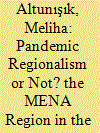

|
|
|
|
|
| Summary/Abstract |
Management and control of pandemics can be imperative for regional cooperation and solidarity. In the Middle East and North Africa (MENA) region, existing regional organisations mainly failed to deal effectively with Covid-19, although they differed in their performances. Instead, both the regional countries and extra-regional powers preferred to address the pandemic through bilateral health diplomacy. Thus, the pandemic has not been transformative in terms of regionalism and regional politics in the MENA region. There were, however, examples of regionalisation, namely cooperation at the societal level and among health officials, which points to the equal importance of bottom-up processes of regional solidarity.
|
|
|
|
|
|
|
|
|
|
|
|
|
|
|
|
| 17 |
ID:
185405


|
|
|
|
|
| Summary/Abstract |
For the last three years, the attention of the world has been caught by the social unrest that has spilled over from events happening in Tunisia to other countries in the MENA region. The region is struggling in both improving historical problems and offering clear path of political stability and economic growth for its current and future generations. In particular the crises in Syria and Libya have intensified the political tensions in the region and brought economic growth into stagnation.
|
|
|
|
|
|
|
|
|
|
|
|
|
|
|
|
| 18 |
ID:
170398
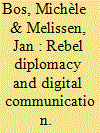

|
|
|
|
|
| Summary/Abstract |
Most research on social media as a tool for public diplomacy focuses on its use by recognized international actors to advance their national interest and reputation, deliver foreign policy objectives or promote their global interests. This article highlights the need for paying more attention to non-state diplomacy in conflict situations outside the western world. We examine how rebel groups use new media to enhance their communications, and what the motivations behind this are. Our public diplomacy perspective helps convey the scope of rebel communications with external actors and provides insights for policy-makers seeking to ascertain the nature, intentions and capacities of myriad rebel groups. Our focus is on the Sahel region, where numerous such groups vying for international attention and support make use of multiple social media channels. We analyse two groups in Mali: the MNLA, a Tuareg secessionist group; and Ansar Dine, a Salafist insurgency with ties to Al-Qaeda in the Islamic Maghreb. Our qualitative analysis of Ansar Dine and MNLA communications on several digital platforms helps identify these African rebel groups' international and local framing activities. Rebel groups use public diplomacy nimbly and pragmatically. The digital age has fundamentally changed which stakeholders such groups can reach, and we suggest that social media increase the power they are able to carve out for themselves on the international stage.
|
|
|
|
|
|
|
|
|
|
|
|
|
|
|
|
| 19 |
ID:
170957
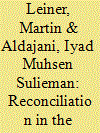

|
|
|
|
|
| Summary/Abstract |
This article explores an innovative approach to finding a solution to the existing and imminent violent struggles in the Middle East and North Africa (MENA), particularly with regard to the issue of reconciliation in the Israeli-Palestinian conflict. The article defines a scientific approach adopted by the Jena Center for Reconciliation Studies (JCRS), cited as the Hölderlin perspective (Martin Leiner, Susan Flamig, 2012, p. 18). It illustrates the philosophical foundation for applying the Hölderlin Perspective, using Phronetic Social Science, to engage in reconciliation processes in the middle of conflicts. It also illustrates the German approach toward the Israeli Palestinian conflict and, lastly, presents some concrete, tangible results that
have already been achieved as well as projects that are currently under way with regard to the MENA region.
|
|
|
|
|
|
|
|
|
|
|
|
|
|
|
|
| 20 |
ID:
189573
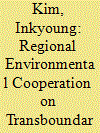

|
|
|
|
|
|
|
|